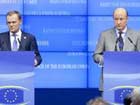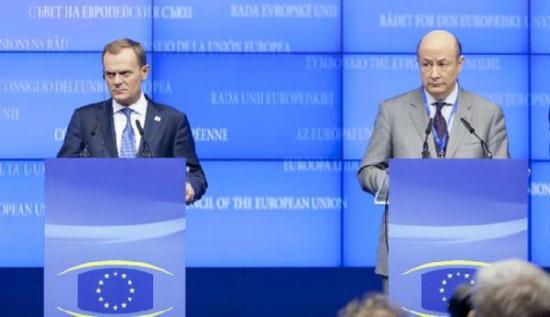| Videos | ? Latest |
|
? Feature | ? Sports | ? Your Videos |
EU leaders to strengthen bank′s liquidity

 0 Comment(s)
0 Comment(s) Print
Print E-mail
CNTV, October 27, 2011
E-mail
CNTV, October 27, 2011
European leaders have reached agreement on bolstering the capital ratio of its banks to 9 percent, in order to provide additional capital buffer amid the ongoing eurozone sovereign debt crisis, said Polish Prime Minister Donald Tusk late Wednesday.
The ratio was decided on after taking into account the market worth of the banks' sovereign debt holdings, said Tusk, whose country holds the European Union (EU) rotating presidency, at a press conference after the EU summit in Brussels.

The prime minister gave no detailed figures for the total amount of fund needed for the bank's recapitalization, saying it was up to the European banking authorities to decide on.
He also said that the recapitalization was a one-off move and that the banks would have to attain the capital ratio target by June 30 next year.
Under the recapitalization plan, banks should first use private sources of capital, including through restructuring and conversion of debt to equity instruments. If banks are unable to raise enough fund themselves, national governments should provide support, according to a statement issued after the EU summit.
"When the national support is not available, recapitalization should be funded via a loan from the European Financial Stability Facility (EFSF)," said the statement.
In the meantime, the EU urged national supervisory authorities to ensure that banks' plans to strengthen capital do not lead to excessive deleveraging, including maintaining the credit flow to the real economy.
Tusk said, however, the success of the recapitalization plan depends on whether agreements can be achieved on other key elements of the rescue package.
"The bank recapitalization plan is just a precondition and an introduction for discussions on other key elements. The plan can't be seen in isolation and won't have a chance of success without the other key parts of the rescue package," Tusk told reporters.
Each member state of the eurozone accepted the idea of the bank recapitalization, but "I'm cautious that all decisions could be adopted at today's eurozone summit, so we have to be patient," the prime minister said.
At the ongoing summit, leaders of the eurozone member states were trying to narrow their differences on how to beef up the firepower of the EFSF, a 440-billion-euro bailout fund, and how much losses private holders of the Greek government bonds have to accept.





